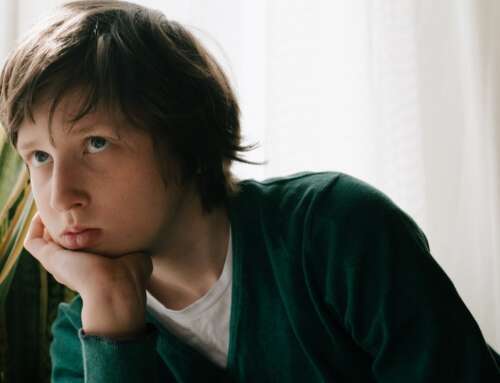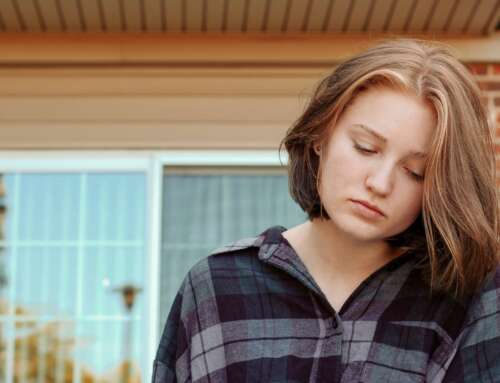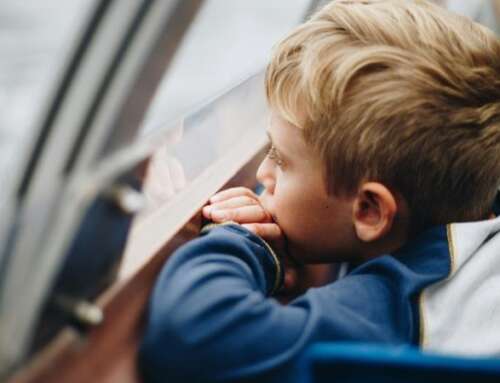
Research reveals some parents go through a grieving process when their child is diagnosed with a mental illness, and it often goes unnamed. Shannon Chapman talks about her experience, and how you can move through the process in a mentally healthy way.
Just over a year ago, my son experienced severe anxiety around going to school. One day during the school drop-off, after weeks of facing tears, panic, and public outbursts from my child sobbing that he ‘couldn’t cope’, I sat down at my desk, picked up the phone and burst into tears. They were deep, heavy, wracking sobs, and something in me twigged, “this feels like something more than everyday sadness.” Being a researcher by trade, I got to Googling and came across a research paper that spoke to me – Grief: The Unrecognized Parental Response to Mental Illness in a Child.
This might seem like a big jump to you, but the call I was about to make, before the tears fell, was to a child psychologist, asking for an appointment for my son. The thing I’d always feared had come true – like me, my son was showing all the signs of an anxiety disorder, and as his doctor had suggested earlier that week, he may benefit from early intervention with a psychologist. (We had already ruled out anything going on at school or home.)
In that moment, something opened in me, an overwhelming whirl of thought, “my child will struggle, and I can help, but I can’t take it away for him.” Having experienced a serious anxiety disorder in my twenties that spanned many years and changed the course of my life, I know you can be looking down the barrel of a long and painful, sometimes life altering journey. I was terrified for him, and honestly, for how I’d cope. There was also a deep sadness that my son wasn’t going to live the life I’d hoped for him: anxiety free, confident and just easier. A life without an anxiety disorder.
Fast forward a year later and my son has learned some good coping skills and is on an even keel, but he is susceptible to further anxiety and depressive episodes later in life. At the end of the day, the grief I experienced was brief, but then my son’s outlook is good – it may or may not affect him again later in life, and is unlikely to significantly change the boy I know – all things gained from the benefit of hindsight, but in the moment, the what ifs overwhelmed me. What I did learn from the experience and my research was that some parents, upon finding themselves at the business end of their child being diagnosed with a mental illness, may well experience unrecognised grief.
The research points out that the normal grief response of parents to the death of a child of any age is well documented, but parents whose child develops a mental illness can actually experience a similar grief, and it often goes unrecognised or is not validated. Case in point: Your child has a mental illness diagnosis. You feel grief for the future of the child you have “lost” and instantly, for a lot of us, the phrase “first world problem” kicks in – after all, your child will still be with you, you will still even have the child you know and love a lot, if not all, of the time. You rationalise that some parents actually lose their kids which is a “real reason” to feel this grief , and that it’s not about you, it’s about them, and hey presto, you’ve talked yourself out of your “right” to grieve. The problem is, just because you rationalise it away, it doesn’t mean you aren’t actually experiencing grief or that you wouldn’t benefit enormously from additional support, it just means you’ve squashed it down to fester. You can’t address a feeling you deny you are experiencing.
– Shannon Chapman
via Grief And Mental Illness | Behaviour & Discipline For Younger Kids | Essential Kids.







Yes, I feel exactly that way. I have one child with severe depression and anxiety, another with anxiety. As a parent you love, nurture and cherish our children. We try to give them the best opportunities to thrive and have a full and happy life. Having children with these issues I am constantly thinking where did I go wrong. Some other parents look at you as if you have failed to create resilient children. No ones blame is as bad as your own I live with this every day.
Hi Shannon
I was interested to read your article although I did feel that it only addressed how a parent feels when their child/teen experiences an anxiety disorder and that a parent may suffer from grief. I can add, that in my experience, with two sons with varying degrees of anxiety/depression disorders that it is actually way more than that for a parent. What I have struggled with is the daily difficulties with both sons in the home and how to continue walking this road with them without “throwing them out in the street” which is all too common for teenagers these days. More parenting skills, more available government funded programs for parents (including addressing the lack of mental health interventions) is paramount to supporting our young people. It’s been a long road for me, as I also suffer from anxiety and depression, which comes and goes depending on my life stressors. I was one of the lucky ones to be referred to an adolescent psychologist to assist me to parent my boys. Without her help, I wouldn’t of got through this journey with them. Sometimes it has been so difficult that I have thought about ending all of our lives, just to stop the pain. They are 18 and 20 years old now. The journey continues…………… I hope we make it.
Hi Deb
Yes it is a long hard road. I have anxiety and depression as well but I just push myself to get going by being grateful for each day I have as well as counting the positives. I do a lot for other people which takes my mind off myself as I focus on others and their plights.
I wish you the best.
I think as your boys get older the impact will hopefully lessen as maturity and other coping mechanisms come to light.
take care Vicky
Hi Deb,
You’re right, the article was aimed at exploring this one part of being a parent of a child with mental illness. I dont think Shannon was saying that this is an exclusive issue that parents in this situation face but one that is often misunderstood or neglected and therefore needs to be discussed. Giving a name to it and acknowledging its existence gives you power to deal with it. I sure do relate to it.
I agree with the writer above. It is so hard to cope with the day to day of dealing with such kids, as there are highs and lows along the way. We have been battling our way through for several years with no clear freedom from the issues yet. It is hard to keep positive but I am gaining knowledge all the time and must continue to believe that we will succeed. There have been some wonderful professional people and equally others in alternative health areas along the way but beware some real quacks and people to avoid who should know better. Trust your judgement (and that of your child) when coming into contact with those who are not only ineffective but potentially damaging by their thoughtless disregard for you child’s best interest.
Thank you for this. Three years ago my daughter became depressed. Initially I thought it was something that would eventually beat. When I realized it was something that she most likely would be fighting for her lifetime I felt like an utter failure. I obviously hadn’t given her what she needed to grow into a happy resilient child. But lately I’ve started to rethink how I feel about things. Maybe we were brought together because I could helper her as a Mom. Maybe this is about guiding this beautiful girl into having the best life possible and I’m the person to do it. Instead of failure I now see the challenge of looking at her life beyond my parenting skills and helping her cope on her journey. It’s also given me a sense of boundaries. I need to take care of myself, I don’t have to tip toe around her anymore and once and a while I allow myself the luxury of being cranky with her like any mother of a teenage daughter.
Reading these posts makes me want to cry…with relief, empathy and grief. All three of my teenagers live with mental illness – anxiety, depression, eating disorders, self harm, school refusal, suicidal ideations. It’s having a significant impact on my mental health and has played a big role in the breakdown of my marriage (we have just agreed to separate after 20 years’ marriage). We have access to good services but more needs to be done to understand and support families like ours so they don’t get to the same stage mine is – completely destroyed. Because of their poor school attendance, my children are not well-education in the traditional sense (although they are bright!) and what they’re living with will affect them for the rest of their lives. A higher level of support and understanding from all facets of the community would make a significant and sustainable difference. I feel for all families living with this – it’s a nightmare you can’t explain to anyone who hasn’t experienced this and one you can’t wake up from!